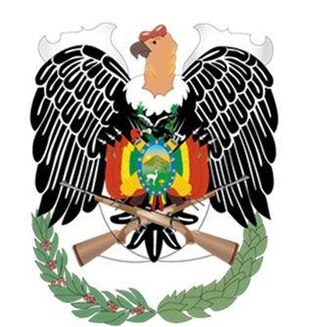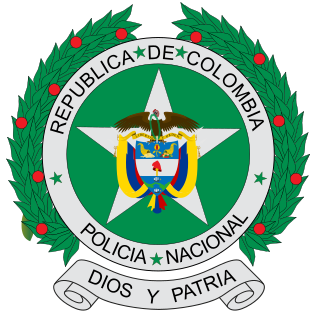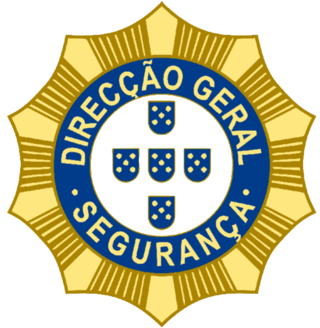Related Research Articles

Secret police are police, intelligence, or security agencies that engage in covert operations against a government's political, religious, or social opponents and dissidents. Secret police organizations are characteristic of authoritarian and totalitarian regimes. They protect the political power of a dictator or regime and often operate outside the law to repress dissidents and weaken political opposition, frequently using violence. They may enjoy legal sanction to hold and charge suspects without ever identifying their organization.

The Civil Guard is the oldest law enforcement agency in Spain and is one of two national police forces. As a national gendarmerie force, it is military in nature and is responsible for civil policing under the authority of both the Ministry of the Interior and the Ministry of Defence. The role of the Ministry of Defence is limited except in times of war when the Ministry has exclusive authority. The corps is colloquially known as the benemérita. In annual surveys, it generally ranks as the national institution most valued by Spaniards, closely followed by other law enforcement agencies and the armed forces.

The National Intelligence Centre is the Spanish official intelligence agency, acting as both its foreign and domestic intelligence agency. Its headquarters are located next to the A-6 motorway near Madrid. The CNI is the successor of the Centro Superior de Información de la Defensa, the Higher Centre for Defence Intelligence. Its main target areas are North Africa and South America and it operates in more than 80 countries. CNI's official budget for 2021 is approximately 300 million euros.
The International and State Defense Police was a Portuguese security agency that existed during the Estado Novo regime of António de Oliveira Salazar. Formally, the main roles of the PIDE were the border, immigration and emigration control and internal and external state security. Over time, it came to be known for its secret police activities.
A security agency is a governmental organization that conducts intelligence activities for the internal security of a nation. They are the domestic cousins of foreign intelligence agencies, and typically conduct counterintelligence to thwart other countries' foreign intelligence efforts.

The Bolivarian National Intelligence Service is the premier intelligence agency in Venezuela. SEBIN is an internal security force subordinate to the Vice President of Venezuela since 2012 and is dependent on Vice President Delcy Rodríguez. SEBIN has been described as the political police force of the Bolivarian government.

The National Police Corps is the national civilian police force of Spain. The CNP is mainly responsible for policing urban areas, whilst rural policing is generally the responsibility of the Civil Guard, the Spanish national gendarmerie force. The CNP operates under the authority of Spain's Ministry of the Interior. They mostly handle criminal investigation, judicial, terrorism and immigration matters. The powers of the National Police Corps varies according to the autonomous community. For example, the Ertzaintza and the Mossos d'Esquadra are the primary police agencies in the Basque Country and Catalonia, respectively. In Navarre they share some duties jointly with Policía Foral (Foruzaingoa).
The Sistema de Informações da República Portuguesa is the coordinating structure of the Portuguese intelligence.

Law enforcement in Bolivia is reliant on the 40,000-member Cuerpo de Policía Nacional responsible for internal security and maintaining law and order. Unlike many South American countries, the Bolivian police force always has been accountable to the national government rather than to state or local officials. The 1950 Organic Law of Police and Carabiniers officially separated the police from the military. Frequently, however, the national police call upon the military for assistance in quelling riots and civil protests.

The National Police of Colombia is the national police force of the Republic of Colombia. Although the National Police is not part of the Military Forces of Colombia, it constitutes along with them the "Public Force" and is also controlled by the Ministry of Defense. The National Police is the only civilian police force in Colombia. The force's official functions are to protect the Colombian nation, enforce the law by constitutional mandate, maintain and guarantee the necessary conditions for public freedoms and rights and to ensure peaceful cohabitation among the population.

The Federal Police, formerly known as the Policía Federal Preventiva and sometimes referred to in the U.S. as "Federales", was a Mexican national police force formed in 1999. In 2019 it was incorporated into the National Guard and operated under the authority of the Department of Security and Civil Protection.
The Agence Nationale de Renseignements (ANR) is a government intelligence agency of the Democratic Republic of the Congo (DRC). The role of the agency is to ensure "internal security and external security" of the state. The agency was strongly criticized for the disrespect of human rights by several organisations. Inzun Kakiak has led the agency since 2019.

The Security and Intelligence Agency is the Croatian security and intelligence service founded in 2006 upon the passing of the Security and Intelligence System of the Republic of Croatia Act and by combining the former Counterintelligence Agency (POA), and the Intelligence Agency (OA) which both ceased to operate.

The Foreigners and Borders Service - SEF was the police service integrated into the Ministry of Internal Affairs, whose mission was to enforce immigration and asylum in Portugal, in accordance with the provisions of constitutional, legal and governmental guidelines.
The National Police of Honduras is the uniformed police force of the Republic of Honduras. The force is organised into regional headquarters, municipal headquarters, headquarters of fixed or mobile stations, and police posts. There are at least 360 police centres throughout Honduras. The National Police of Honduras has its headquarters in Tegucigalpa, the capital city of Honduras. The National Police of Honduras is the fourth largest police body in Central America by number of employees. It is the sixth largest force in Central America by police officers per capita. The force's patroness is the Virgin of Carmen. On 16 July of each year the "National Police Patroness Day" is celebrated.

The General Directorate of Security was a Portuguese criminal police body active between 1969 and 1974, during the last years of the Estado Novo dictatorship.
References
- ↑ John F. Clark and Samuel Decalo, Historical Dictionary of Republic of the Congo, Fourth Edition (2012), page 134.
- ↑ Novo, Andrew (2019). "Birth of the Cold War: irregular warfare first blood in Greece". Small Wars & Insurgencies. 30 (1): 31–61. doi:10.1080/09592318.2018.1554338. S2CID 150452858.
- ↑ Kalyvas, Stathis N. (2015). "Rebel Governance During the Greek Civil War, 1942–1949". Rebel Governance in Civil War. Cambridge University Press. pp. 119–137. ISBN 978-1-107-10222-4.
- ↑ Nyrop, Richard F. (ed.). Guatemala: A Country Study (1983), p. 202
- ↑ Abbott, Elizabeth (1988). Haiti: An insider's history of the rise and fall of the Duvaliers. Simon & Schuster. p. 116 ISBN 0-671-68620-8
- ↑ "Mozambique: Six Months After Independence" Archived 2007-12-17 at the Wayback Machine AliciaPatterson.org. Accessed on May 29, 2008.
- ↑ http://lcweb2.loc.gov/cgi-bin/query/r?frd/cstdy:@field(DOCID+so0125) [ dead link ]
- ↑ "Army Spied on 18,000 Civilians in 2‐Year Operation". The New York Times. 1971-01-18. ISSN 0362-4331 . Retrieved 2023-06-15.
- ↑ Gibbons, William Conrad, The U.S. Government and the Vietnam War: Executive and Legislative Roles and Relationships, Part IV: July 1965-January 1968 (Princeton Legacy Library), p. 854.
- ↑ Smith, Harvey Henry, Area Handbook for South Vietnam: Volume 550, Issue 55, p. 220 (1967). U.S. Government Printing Office
- ↑ Glickson, Roger C.; Sinai, Joshua (1994). "The Intelligence Apparatus and Security Forces". In Meditz, Sandra W.; Merrill, Tim (eds.). Zaire: a country study (4th ed.). Washington, D.C.: Federal Research Division, Library of Congress. p. 319. ISBN 0-8444-0795-X. OCLC 30666705.